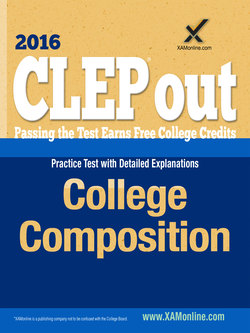Читать книгу CLEP College Composition - Sharon A Wynne - Страница 3
На сайте Литреса книга снята с продажи.
COLLEGE COMPOSITION
ОглавлениеDescription of the Examination
The CLEP College Composition examinations assess writing skills taught in most first-year college composition courses. Those skills include analysis, argumentation, synthesis, usage, ability to recognize logical development and research. The exams cannot cover every skill (such as keeping a journal or peer editing) required in many first-year college writing courses. Candidates will, however, be expected to apply the principles and conventions used in longer writing projects to two timed writing assignments and to apply the rules of standard written English.
College Composition contains approximately 50 multiple-choice items to be answered in approximately 50 minutes and two essays to be written in 70 minutes (with 30 minutes to write the first essay and 40 minutes to read the two sources and write the second essay), for a total of approximately 120 minutes testing time. Essays must be typed on the computer.
The actual examination contains multiple-choice items and two mandatory, centrally scored essays. The essays are scored twice a month by college English faculty from throughout the country via an online scoring system. Each of the two essays is scored independently by two different readers, and the scores are then combined. This combined score is weighted approximately equally with the score from the multiple-choice section. These scores are then combined to yield the candidate’s score. The resulting combined score is reported as a single score between 20 and 80. Separate scores are not reported for the multiple-choice and essay sections.
Knowledge and Skills Required
The subject matter of the College Composition examination is drawn from the following topics. The percentages next to the main topics indicate the approximate percentage of exam questions on that topic for the 50 multiple-choice items.
| 10% | Conventions of Standard English measures the awareness of logical, structural and grammatical relationships within sentences. Questions relate to syntax, punctuation, concord/agreement, modifiers, active versus passive voice and additional areas |
| 40% | Revision Skills measures revision skills in the context of early essays, such as organization, level of detail, awareness of audience or tone, sentence variety and structure, main ideas, transitions, point of views |
| 25% | Ability to Use Source Material measures familiarity with basic reference and research skills via the use of reference materials, evaluation of sources, integration of resources and documentation |
| 25% | Rhetorical Analysis measures ability to analyze writing primarily using passage based questions reviewing appeals, tone, structure, rhetorical effects |
